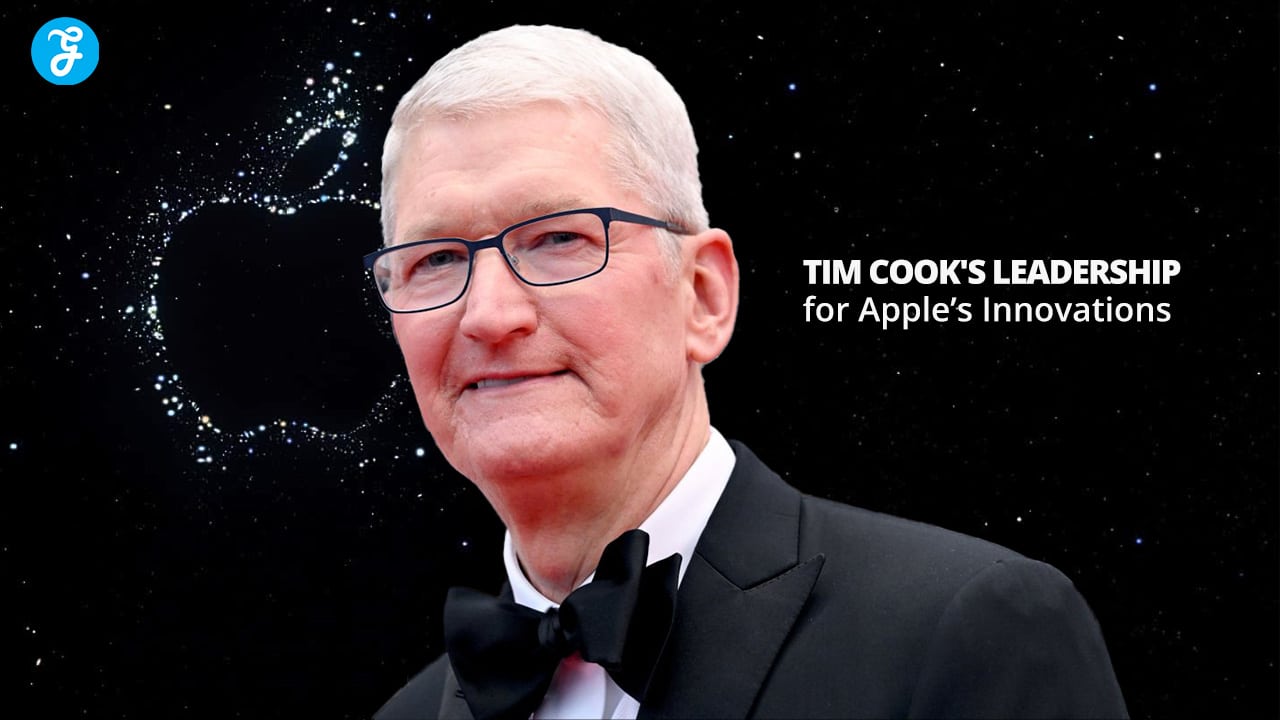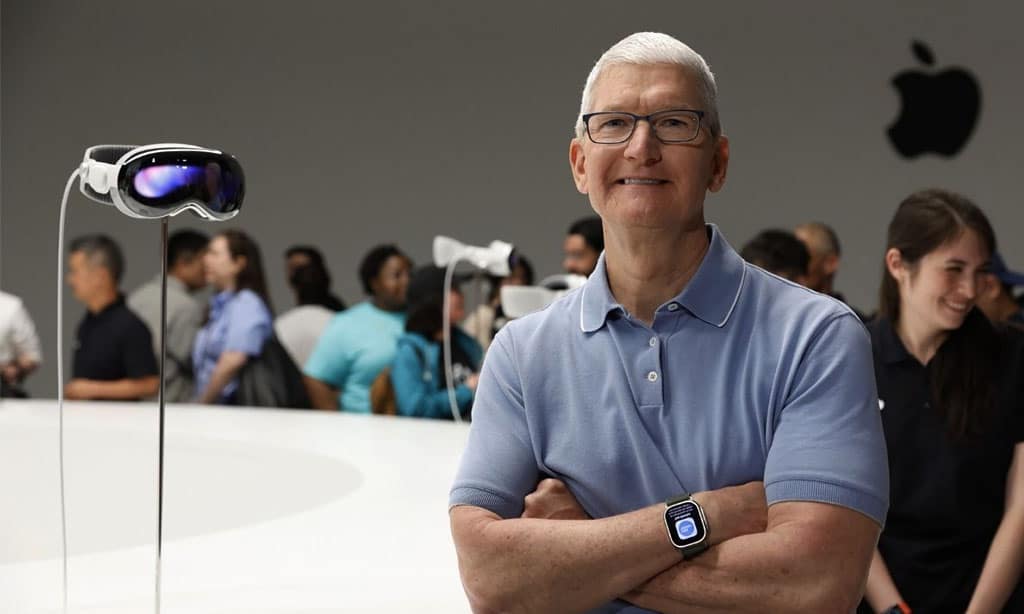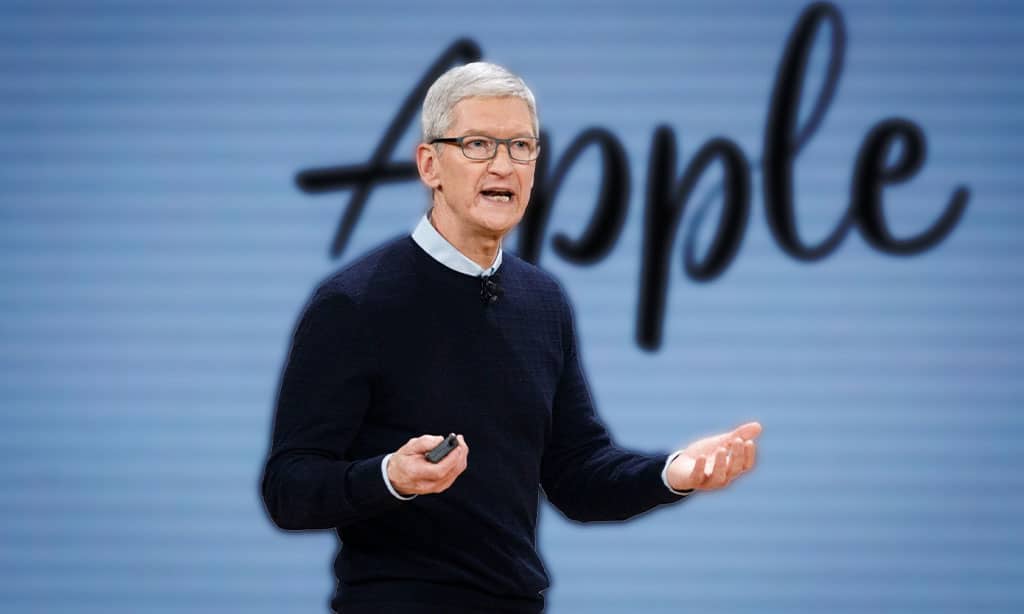In the fast-paced world of technology, few companies have left as indelible a mark as Apple Inc. When Steve Jobs stepped down as CEO in 2011, many wondered if the company could maintain its innovative edge. Enter Tim Cook, a man whose leadership style differed greatly from his predecessor’s, yet whose impact on Apple has been nothing short of transformative.
As we delve into the ways Tim Cook has advanced Apple’s innovations, we embark on a journey through a decade of technological evolution. From the palm of your hand to the world’s most advanced chip factories, from your wrist to the clouds above, Cook’s Apple has pushed boundaries in ways both visible and behind the scenes.
This article explores 20 key innovations and strategic moves that have defined Apple under Tim Cook’s stewardship. Each represents not just a product or a service, but a step towards a future where technology seamlessly integrates with our daily lives, all while prioritizing privacy, accessibility, and environmental responsibility.
So, whether you’re an Apple enthusiast, a tech industry watcher, or simply curious about how one of the world’s most valuable companies has evolved, join us as we unpack the Cook era at Apple – an era marked by bold moves, strategic pivots, and relentless innovation.
Key Apple Innovations and Milestones Under Tim Cook (2011-2023)
| Year | Innovation/Milestone | Impact/Significance |
|---|---|---|
| 2011 | Tim Cook becomes CEO | Marks the beginning of a new era for Apple |
| 2014 | iPhone 6 and 6 Plus | Apple embraces larger screen sizes |
| 2014 | Apple Pay launched | Enters mobile payment market |
| 2015 | Apple Watch introduced | Enters wearable technology market |
| 2016 | AirPods released | Revolutionizes wireless audio market |
| 2016 | iPhone 7 removes headphone jack | Controversial move pushes wireless audio adoption |
| 2017 | iPhone X with Face ID | Introduces new biometric security standard |
| 2017 | ARKit released | Pushes augmented reality into mainstream |
| 2018 | Apple becomes first $1T US company | Milestone in market valuation |
| 2019 | Apple Card introduced | Expands financial services offerings |
| 2019 | Apple TV+ launched | Enters original content streaming market |
| 2020 | M1 chip introduced | Begins transition from Intel to Apple Silicon |
| 2020 | App Tracking Transparency announced | Strengthens user privacy protections |
| 2021 | AirTag released | Enters item tracking market |
| 2022 | Emergency SOS via satellite introduced | Brings satellite connectivity to iPhones |
| 2022 | Apple becomes first $3T US |
1. Expansion of the iPhone Line
Under Cook’s leadership, Apple dramatically expanded the iPhone line, catering to a broader range of consumers and use cases:
- In 2014, Apple introduced the iPhone 6 and 6 Plus, finally embracing larger screen sizes and kickstarting a new era of “phablets”.
- 2016 saw the launch of the iPhone SE, a more affordable option that brought high-end specs to a compact form factor.
- The iPhone X, released in 2017, marked a radical redesign with its edge-to-edge display and Face ID technology.
- Subsequent years brought further diversification, including the premium iPhone Pro models and the reintroduction of a new, more powerful iPhone SE in 2020.
This strategy allowed Apple to maintain its premium brand image while also capturing market share in mid-range segments, particularly in emerging markets.
2. Development of Apple Silicon
The transition to Apple-designed chips for Mac computers, announced in 2020, represents one of the most significant shifts in Apple’s history:
- The M1 chip, introduced in November 2020, marked the beginning of this transition.
- Subsequent chips like M1 Pro, M1 Max, M1 Ultra, and the M2 series have continued to push performance boundaries.
- This move allowed for unprecedented integration between hardware and software in Mac products.
- The transition also gave Apple more control over its product development timeline and reduced dependency on external suppliers.
- Apple Silicon has enabled features like instant wake from sleep, improved power efficiency, and the ability to run iOS apps natively on Macs.
By 2023, Apple had completed its two-year transition plan, with all new Mac models featuring Apple Silicon.
3. Launch of the Apple Watch
The Apple Watch, introduced in 2015, marked Apple’s entry into the wearable technology market:
- It quickly became the best-selling smartwatch globally, outpacing established players in the watch industry.
- The device expanded Apple’s ecosystem, providing seamless integration with other Apple products and services.
- Over successive generations, Apple has significantly enhanced the watch’s health and fitness tracking capabilities, including features like ECG monitoring, blood oxygen measurement, and fall detection.
- The Apple Watch has also become a platform for mobile payments via Apple Pay, further integrating users into Apple’s service ecosystem.
- By 2023, the Apple Watch had evolved into a family of products, including the high-end Ultra model for extreme sports enthusiasts.
4. Creation of AirPods
The launch of AirPods in 2016 revolutionized the wireless earbuds market and became one of Apple’s most successful new product categories:
- AirPods set new standards for ease of use, with features like automatic pairing and ear detection.
- The product line expanded to include AirPods Pro with active noise cancellation in 2019.
- In 2020, Apple introduced AirPods Max, entering the over-ear headphones market.
- By 2022, AirPods had become the world’s best-selling wireless earbuds, capturing a significant share of the global market.
- The success of AirPods also spurred the development of additional audio products like HomePod and HomePod mini.
5. Advancement of Augmented Reality
Cook has been a vocal advocate for augmented reality (AR), positioning Apple at the forefront of this emerging technology:
- In 2017, Apple introduced ARKit, a development platform for creating AR experiences on iOS devices.
- Subsequent iOS updates have brought increasingly sophisticated AR capabilities to hundreds of millions of devices.
- The LiDAR scanner, introduced in iPad Pro (2020) and iPhone 12 Pro, enhanced AR experiences with improved depth sensing.
- In 2023, Apple unveiled the Vision Pro, its first mixed reality headset, representing a major step into spatial computing.
- These initiatives have laid the groundwork for future AR products and positioned Apple as a leader in this space.
6. Focus on Services
Tim Cook significantly expanded Apple’s services business, creating new revenue streams and increasing customer engagement:
- Apple Music, launched in 2015, grew to over 80 million subscribers by 2023.
- The App Store has seen continuous growth, with developer earnings exceeding $320 billion by 2023.
- Apple TV+, introduced in 2019, has garnered critical acclaim with shows like “Ted Lasso” and “The Morning Show”.
- Other services launched under Cook include Apple Arcade, Apple News+, and Apple Fitness+.
- By 2023, Services had become Apple’s second-largest revenue segment, showcasing the success of this strategic pivot.
7. Emphasis on Privacy and Security
Cook has made privacy a core tenet of Apple’s products and services:
- Introduction of privacy nutrition labels for apps in the App Store in 2020.
- Implementation of App Tracking Transparency in iOS 14.5, giving users more control over their data.
- Enhanced encryption for iCloud data and iMessage communications.
- Introduction of features like Hide My Email and Private Relay as part of iCloud+.
- Consistent advocacy for user privacy in public forums and legal battles.
8. Environmental Initiatives
Under Cook, Apple has made significant strides in environmental sustainability:
- Commitment to become carbon neutral across its entire business, including supply chain, by 2030.
- Achieved 100% renewable energy for all Apple facilities worldwide in 2018.
- Increased use of recycled materials in products, including recycled rare earth elements in iPhone 12.
- Launch of the Restore Fund in 2021, investing in forestry projects to remove carbon from the atmosphere.
- Introduction of the Apple Environmental Progress Report, providing transparent updates on sustainability efforts.
9. Expansion of Apple Pay
Cook oversaw the launch and expansion of Apple Pay in 2014:
- By 2023, Apple Pay was available in over 70 countries and regions.
- Introduction of Apple Cash for peer-to-peer payments in 2017.
- Launch of the Apple Card in partnership with Goldman Sachs in 2019.
- Integration of Apple Pay with transit systems in major cities worldwide.
- Development of tap-to-pay technology, allowing iPhones to accept contactless payments directly.
10. Development of the Apple Pencil
The Apple Pencil, introduced in 2015, enhanced the iPad’s capabilities for creative professionals and note-takers:
- The second-generation Apple Pencil in 2018 brought magnetic attachment and wireless charging.
- Integration with iPadOS features like Scribble for handwriting recognition.
- Partnerships with app developers to create optimized experiences for Apple Pencil users.
- Expansion of Apple Pencil compatibility across the iPad line, including non-Pro models.
11. Investment in Artificial Intelligence
Cook has pushed for greater AI integration in Apple products:
- Significant improvements to Siri’s capabilities and integration across Apple’s ecosystem.
- Development of the Neural Engine in A-series and M-series chips for on-device machine learning.
- Introduction of features like Smart HDR and Deep Fusion for computational photography.
- AI-powered features in iOS, such as Live Text and Visual Look Up.
- Investment in AI research, including publishing in academic journals and presenting at AI conferences.
12. Expansion into Original Content
Under Cook’s leadership, Apple ventured into original content production:
- Launch of Apple TV+ in 2019 with original shows and movies.
- High-profile partnerships with creators like Oprah Winfrey, Steven Spielberg, and Martin Scorsese.
- Critical acclaim for productions like “CODA,” which won the Academy Award for Best Picture in 2022.
- Expansion into sports broadcasting with Friday Night Baseball and MLS Season Pass.
- Integration of original content strategy with hardware sales through extended free trials for new device purchases.
13. Focus on Accessibility Features
Cook has championed accessibility in Apple products:
- Introduction of features like VoiceOver, Switch Control, and AssistiveTouch across Apple’s product line.
- Integration of sign language support in Apple Stores and online customer service.
- Development of accessibility-focused apps and services, including the Shortcuts app for customized device control.
- Introduction of Live Listen to turn AirPods into hearing aids.
- Implementation of BackTap for custom shortcuts through tapping the back of an iPhone.
14. Advancements in Camera Technology
iPhone camera technology has seen significant improvements under Cook:
- Introduction of dual-lens camera systems with the iPhone 7 Plus in 2016.
- Evolution to triple-lens systems with the iPhone 11 Pro in 2019.
- Development of computational photography features like Smart HDR and Night mode.
- Integration of LiDAR scanners in Pro model iPhones for enhanced AR capabilities and improved low-light photography.
- Introduction of Photonic Engine with the iPhone 14 series for improved mid to low-light performance.
15. Creation of the Apple M1 iPad Pro
The integration of the M1 chip into the iPad Pro in 2021 blurred the lines between tablets and laptops:
- Significant performance boost, bringing desktop-class power to a tablet form factor.
- Enabled more desktop-class applications on iPadOS, including professional video editing software.
- Introduction of Thunderbolt support for high-speed data transfer and external display connectivity.
- Positioning of the iPad Pro as a viable laptop replacement for many users, especially creatives.
- Subsequent introduction of Stage Manager in iPadOS 16 for improved multitasking capabilities.
16. Expansion of Apple Retail
Cook has overseen the continued growth and evolution of Apple’s retail presence:
- Redesign of Apple Stores to create community spaces, including the introduction of “Town Squares” concept.
- Expansion into new markets, particularly in Asia, with flagship stores in cities like Shanghai and Singapore.
- Development of the Today at Apple program for in-store education and community engagement.
- Integration of augmented reality experiences in stores.
- Adaptation to COVID-19 challenges with enhanced online shopping experiences and in-store safety measures.
17. Investment in Health Technologies
Under Cook, Apple has made significant strides in health-related technologies:
- Integration of health monitoring features in Apple Watch, including ECG, blood oxygen monitoring, and fall detection.
- Development of the Health app and HealthKit framework for iOS, creating a centralized platform for health data.
- Partnerships with medical institutions for health studies, leveraging the scale of Apple’s user base.
- Introduction of ResearchKit and CareKit for medical research and patient care applications.
- Focus on women’s health features, including cycle tracking and fertility planning tools.
18. Advancements in Audio Technology
Cook’s tenure has seen several audio-related innovations:
- Development of spatial audio for AirPods, creating immersive 3D sound experiences.
- Introduction of the HomePod smart speaker in 2018, followed by the more affordable HomePod mini in 2020.
- Acquisition of Beats Electronics in 2014 for $3 billion, Apple’s largest acquisition to date.
- Integration of Dolby Atmos and lossless audio in Apple Music.
- Development of audio sharing features for AirPods.
19. Focus on Education
Cook has emphasized Apple’s role in education:
- Launch of educational initiatives like Everyone Can Code and Everyone Can Create.
- Development of Schoolwork and Classroom apps for iPads to assist teachers and students.
- Partnerships with educational institutions worldwide, including the ConnectED program in the United States.
- Introduction of Apple Teacher, a free professional learning program for educators.
- Adaptation of educational offerings during the COVID-19 pandemic, including remote learning resources.
20. Commitment to Manufacturing and Job Creation
Under Cook, Apple has:
- Invested $450 billion in its Advanced Manufacturing Fund to support American suppliers and manufacturing.
- Created job opportunities through expansion of its campuses, including the new Apple Park headquarters in Cupertino.
- Supported supplier responsibility and ethical manufacturing practices through its Supplier Responsibility program.
- Committed to creating 20,000 new jobs in the United States by 2023.
- Invested in clean energy projects and job training programs in communities where Apple operates.
Takeaways
As we reflect on the 20 ways Tim Cook’s leadership has advanced Apple’s innovations, it’s clear that his tenure has been marked by both continuity and change. Cook has maintained Apple’s commitment to sleek, user-friendly products while steering the company into new territories – from wearable technology to digital services, from augmented reality to original content production.
Under Cook’s guidance, Apple has not only continued to innovate in its core product lines but has also expanded its reach and influence. The company has become a leader in privacy protection, environmental sustainability, and accessibility – areas that reflect Cook’s personal values and vision for technology’s role in society.
The development of Apple Silicon stands out as a particularly bold move, one that has redefined the capabilities of personal computing. Meanwhile, the expansion into services has created a new, rapidly growing revenue stream that complements Apple’s hardware business.
Cook’s Apple has also shown a willingness to admit missteps and course-correct, as seen with the redesign of the Mac Pro and the reintroduction of popular features like MagSafe in MacBooks.
Looking ahead, Apple under Tim Cook seems poised to continue pushing boundaries. The company’s investments in augmented reality, artificial intelligence, and health technology hint at future innovations that could once again reshape how we interact with technology.
In many ways, Tim Cook’s greatest achievement has been to take a company that was already at the top of its game and find new ways for it to grow, adapt, and lead. As Apple continues to evolve under his stewardship, it remains a standard-bearer for innovation in the tech industry, always with an eye towards the next big thing.
As we move further into the 2020s, it’s clear that Tim Cook’s Apple is not resting on its laurels. With each product launch, service introduction, or policy stance, the company continues to shape the technological landscape. The journey of innovation that began under Steve Jobs continues under Tim Cook, with new chapters yet to be written.







































